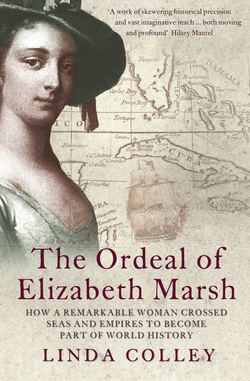Читать книгу The Ordeal of Elizabeth Marsh: How a Remarkable Woman Crossed Seas and Empires to Become Part of World History - Linda Colley - Страница 10
Her Worlds
ОглавлениеThroughout Europe and in parts of the Americas – but also beyond them – the era in which Elizabeth Marsh lived, the middle and later decades of the eighteenth century, witnessed a growing awareness of the connectedness between the world’s different regions and peoples. More informed and classically educated men and women were aware of course that accelerated bursts of what would now be styled globalization had occurred in earlier periods of history. ‘Previously the doings of the world had been, as one might say, dispersed,’ the ancient Greek historian Polybius wrote in regard to the third century BC. But, as a result of the conquests of imperial Rome, he continued, ‘history has come to acquire an organic unity, and the doings of Italy and Libya [i.e. Africa] are woven together with those of Asia and Greece, and the outcome of them all tends toward one end’.3 Historians since have identified other such ‘global moments’: how, by the end of the thirteenth century, trade was able for a time to link merchants in parts of India and China, the Levant, the Persian Gulf, and various European ports and city states, for instance, and how Spain’s conquest of Manila in 1571 inaugurated new systems of commerce, migration and bullion-exchange between Asia, South-East Asia, the Americas and Europe.4 Nonetheless, the rate at which different sorts of global connections evolved during and after the second quarter of the eighteenth century was perceived by observers in the West, but also outside it, as something new. ‘Everything has changed, and must change again,’ insisted Abbé Raynal in his History of the Two Indies (1770), this era’s most influential discussion and denunciation of Europe’s contacts with Asia, Africa and the Americas. Or, as Edmund Burke famously pronounced in 1777: ‘the great map of mankind is unrolled at once’. It was potentially ‘at the same instant under our view’.5
This sense that the world was becoming visibly more compact and connected was pronounced within Britain itself, and for reasons that shaped much of Elizabeth Marsh’s life. The sea was the prime vehicle and emblem of connectivity, ‘a mighty rendezvous’, as one writer expressed it in 1760; and – as she had ample cause to know – it was Britain that possessed both the most powerful navy and the biggest merchant marine. During Marsh’s lifetime, these maritime advantages allowed Britain, along with France and Russia, increasingly to explore and invade the Pacific, an ocean that occupies a third of the globe’s surface, and of which Europeans had previously possessed only limited routine acquaintance.6 Before, throughout, and after Marsh’s life, Britain was also involved in a succession of wars with France that expanded relentlessly in geographical scale. As a result, London was able to lay claim to the world’s largest and most widely dispersed empire. By 1775, as the German geographer Johann Christoph Gatterer remarked, Britain had become the only power to have intruded decisively, though not always securely or very deeply, into every continent of the globe.7
In addition, Britain’s ambitious commerce, the terrible volume of its slave trading, the growing overseas migration of its own peoples, and its prolific print industry and consumerism – all of which impinged on Elizabeth Marsh’s own experience – encouraged a more vivid consciousness of the world’s expanse and the range of human diversity, which extended well beyond the political class. Had she been more consistently prosperous during her residence in London in the 1760s, Elizabeth might have purchased a pocket globe, an increasingly fashionable accessory at this time, or invested in one of an array of new atlases, encyclopedias, gazettes and children’s books, all promising to unpack the ‘world in miniature’.8 In more senses than one, the proliferation of such artifacts suggested a more graspable world: one that might even be pocketed.
However, there was more to Elizabeth Marsh’s experiences and shifting identity than this British imperial connection; just as there was always more to the growing interrelationship between continents and peoples and oceans at this time than the exertions and ambitions of Britain and other Western powers. That Marsh was born at all was owing, indirectly, and possibly directly, to the enforced migration of millions of West Africans across the Atlantic; and that she was born in England, and not in Jamaica, was due to rebellion on the part of just some of these people. Her career was shaped throughout by the enhanced capacity on the part of British ships, soldiers and merchants to be present globally. But her life was also vitally changed by a Moroccan ruler’s schemes to construct his own world system that would link together sub-Saharan Africa, the Maghreb, the Ottoman Empire and merchants in Western and Eastern Europe, Asia, and ultimately the United States. And if London, Barcelona and Livorno supply backdrops to her story, as centres of transcontinental trade, so also do Basra, and Boston, and Dhaka, and Manila. That Elizabeth Marsh’s life was one of continuous transition was due in part then to a succession of influences and interventions issuing from outside Europe, and to actors who saw the world from different vantage points. Her ordeal was also due to her, to the sort of person she was.
